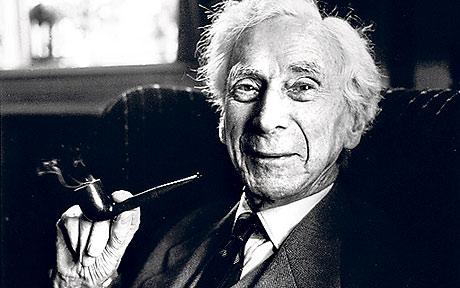
“I should like to say two things, one intellectual and one moral: The intellectual thing I should want to say to them is this: When you are studying any matter or considering any philosophy, ask yourself only what are the facts and what is the truth that the facts bear out. Never let yourself be diverted either by what you wish to believe or by what you think would have beneficent social effects if it were believed, but look only and solely at what are the facts. That is the intellectual thing that I should wish to say.
The moral thing I should wish to say to them is very simple. I should say: Love is wise, hatred is foolish. In this world, which is getting more and more closely interconnected, we have to learn to tolerate each other. We have to learn to put up with the fact that some people say things that we don’t like. We can only live together in that way, and if we are to live together and not die together we must learn a kind of charity and a kind of tolerance which is absolutely vital to the continuation of human life on this planet.”
Did he really say that?
Yes, he said exactly that, here is that segment of the interview …
During the First World War, Russell was one of the few people to engage in active pacifist activities and in 1916, he was dismissed from Trinity College following his conviction under the Defence of the Realm Act 1914. A later conviction for publicly lecturing against inviting the US to enter the war on Britain’s side resulted in six months’ imprisonment in Brixton prison … in 1918
… In August 1920, Russell traveled to Russia as part of an official delegation sent by the British government to investigate the effects of the Russian Revolution. He met Vladimir Lenin and had an hour-long conversation with him. In his autobiography, he mentions that he found Lenin rather disappointing, sensing an “impish cruelty” in him and comparing him to “an opinionated professor”.
… Russell opposed rearmament against Nazi Germany, but in 1940 changed his view that avoiding a full-scale world war was more important than defeating Hitler. He concluded that Adolf Hitler taking over all of Europe would be a permanent threat to democracy. In 1943, he adopted a stance toward large-scale warfare, “Relative Political Pacifism”: War was always a great evil, but in some particularly extreme circumstances, it may be the lesser of two evils
… Russell changed his position and advocated the total abolishment of atomic weapons
… In September 1961, at the age of 89, Russell was jailed for seven days in Brixton Prison after taking part in an anti-nuclear demonstration in London, for “breach of peace”. The magistrate offered to exempt him from jail if he pledged himself to “good behaviour”, to which Russell replied: “No, I won’t.”
… In 1962 Russell played a public role in the Cuban Missile Crisis: in an exchange of telegrams with Soviet leader Nikita Khrushchev, Khrushchev assured him that the Soviet government would not be reckless
… In early 1963, in particular, Russell became increasingly vocal in his disapproval of the Vietnam War, and felt that the US government’s policies there were near-genocidal.
… In 1964 he was one of eleven world figures who issued an appeal to Israel and the Arab countries to accept an arms embargo and international supervision of nuclear plants and rocket weaponry
… On 31 January 1970 Russell issued a statement condemning “Israel’s aggression in the Middle East”
As he thought, so also he lived … and not too many can say that.
The BBC Full Interview from 1959
If curious to see the full interview, there here it is at the age of 89 … still very sharp and witty …